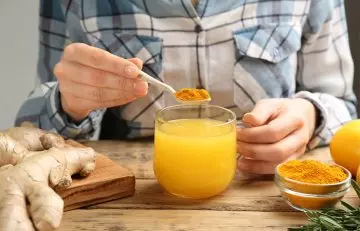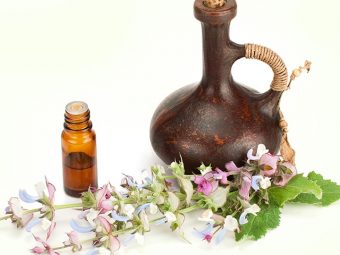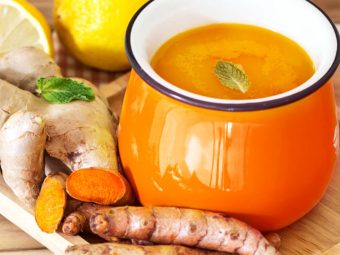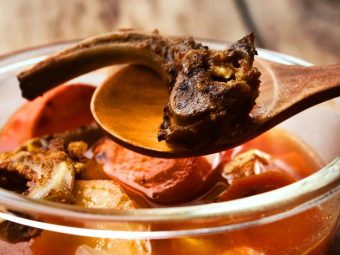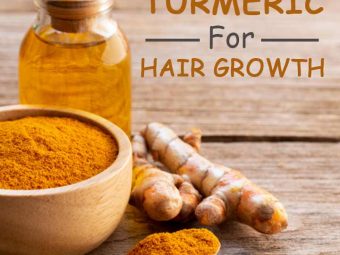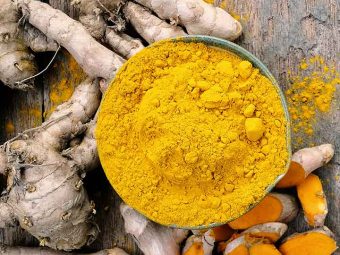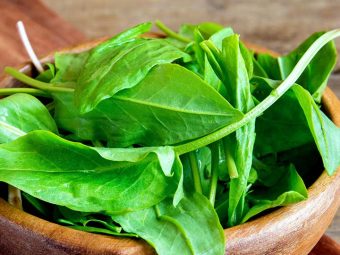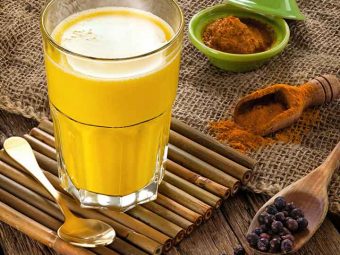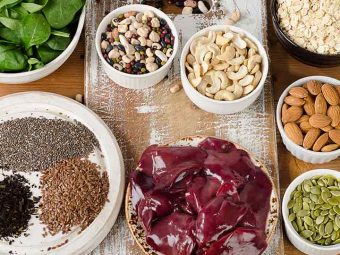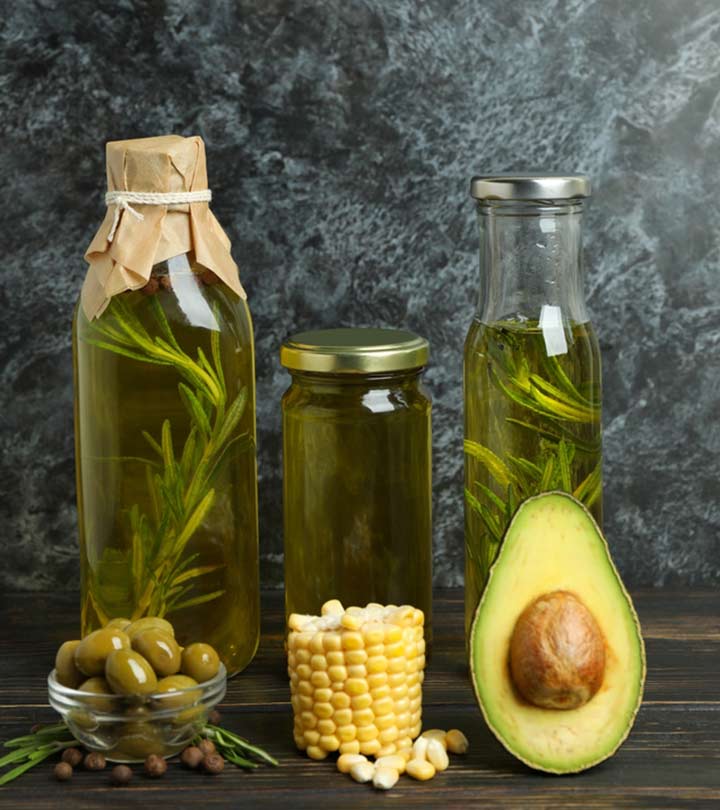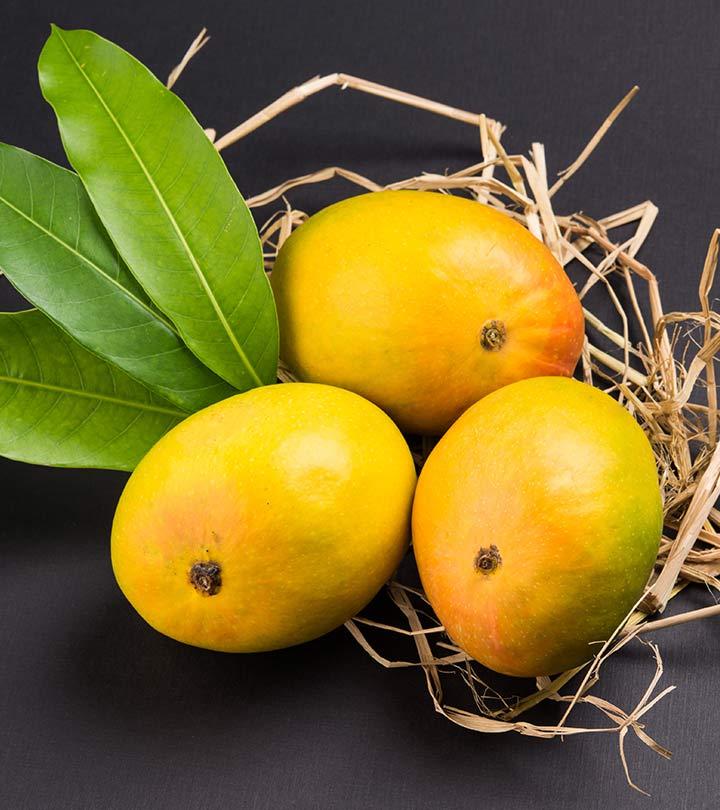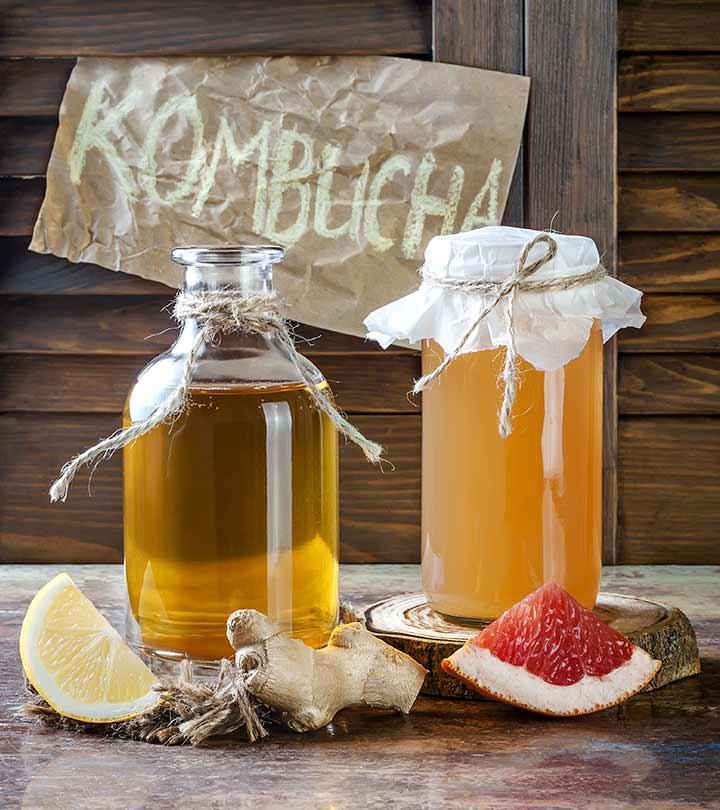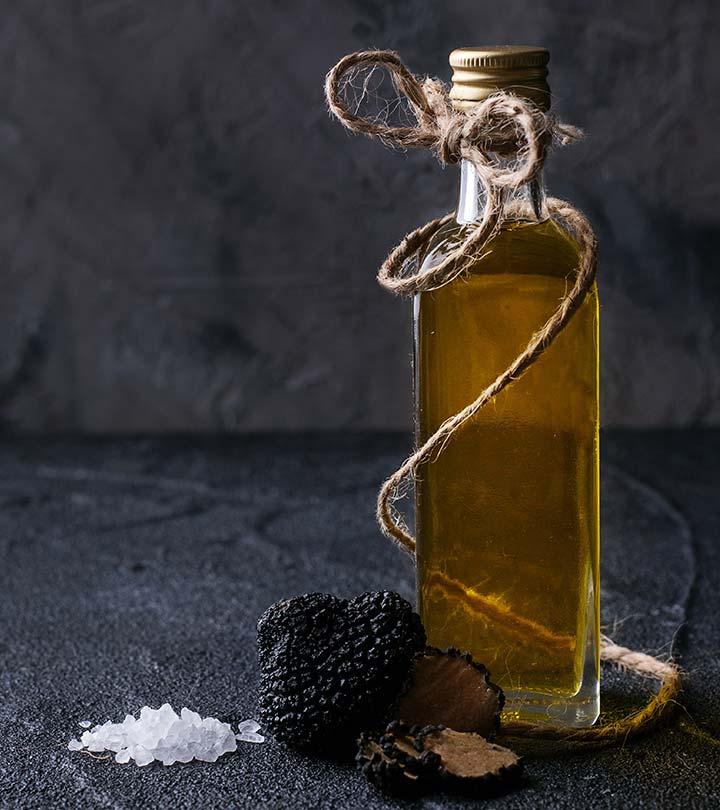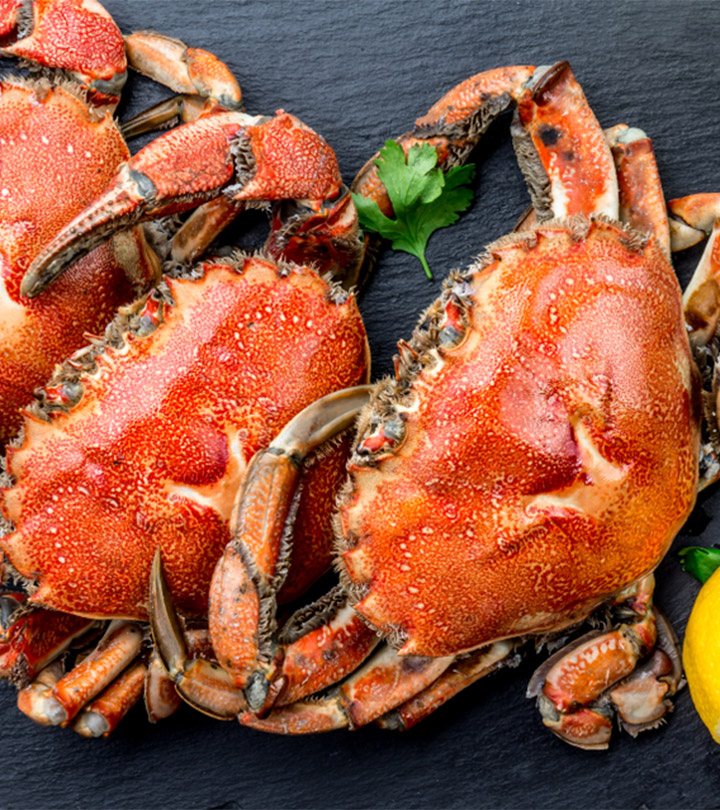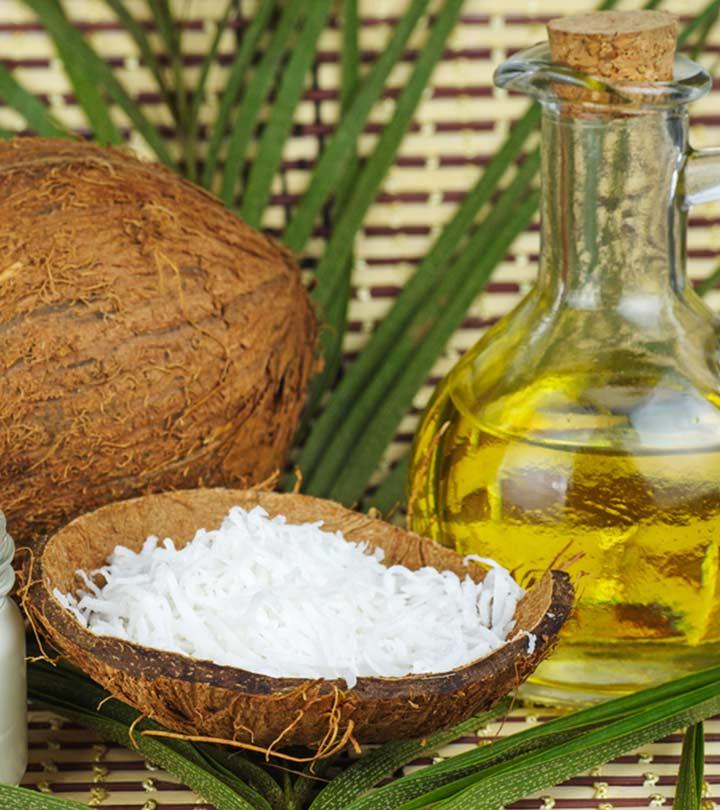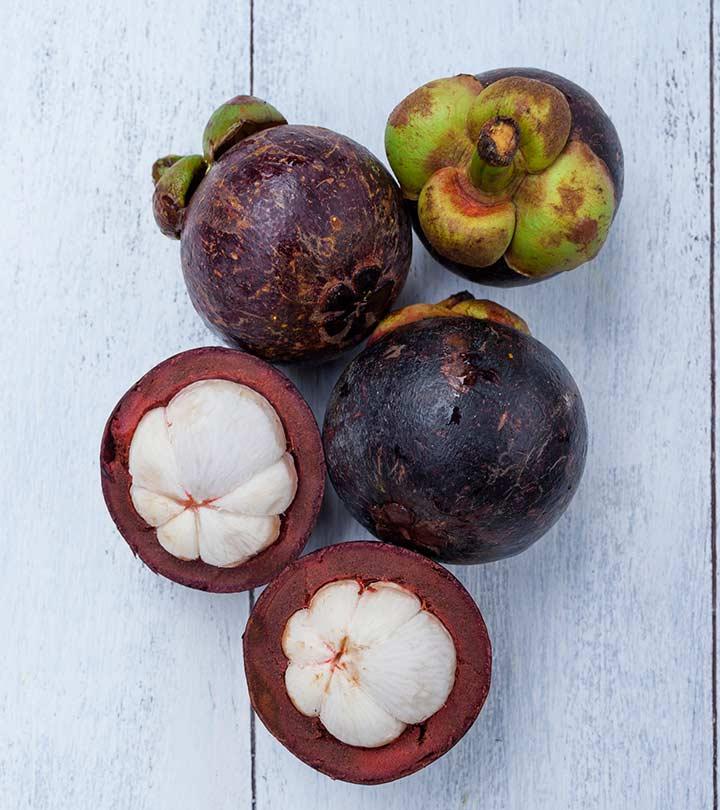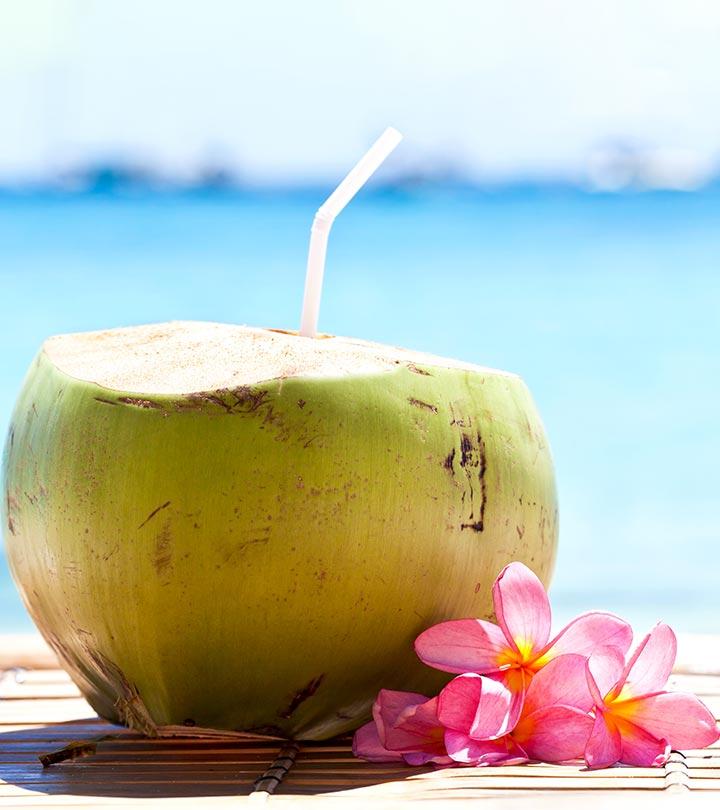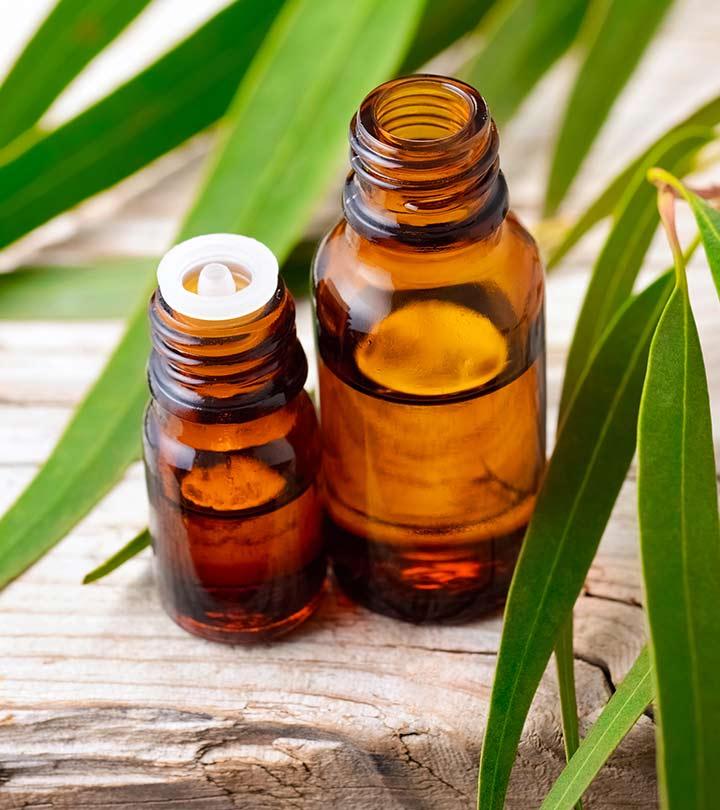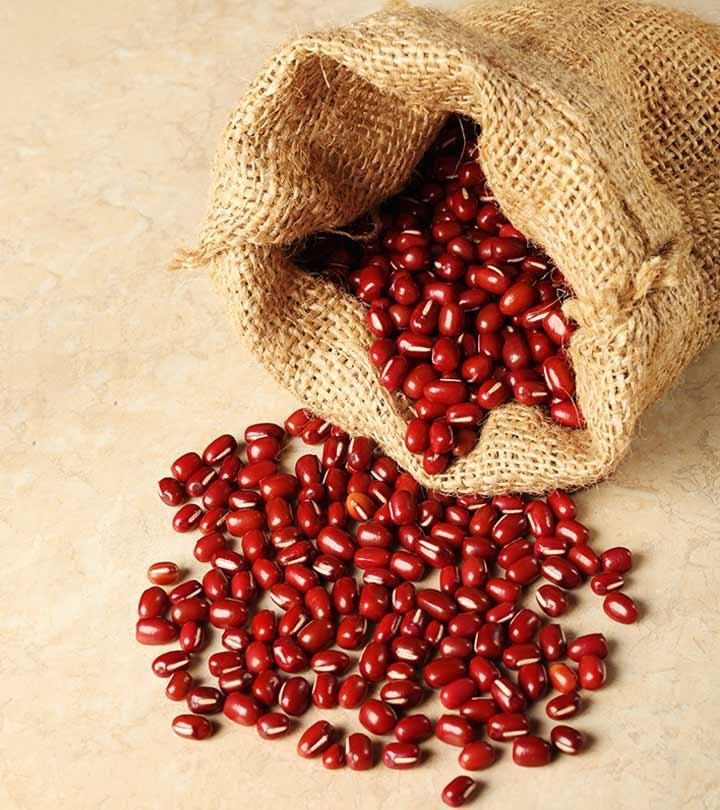19 Health Benefits Of Turmeric, How To Use It, & Side Effects
You would not want to miss out on the amazing effects this Indian spice has to offer.
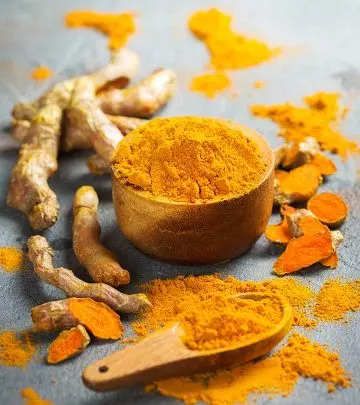
Image: Shutterstock
Turmeric benefits are numerous. The turmeric plant (Curcuma longa) belongs to the family of ginger. It has anti-cancer, anti-inflammatory, antioxidant, and antimicrobial properties (1).
Turmeric has curcumin, which is a major bioactive compound. In herbal treatment, it is used in treating heart diseases, liver ailments, Alzheimer’s, diabetes, urinary tract infections, and wound healing (1).
Learn more about turmeric, its nutrition, the health benefits it offers, and possible side effects from the article below. Scroll down to read further.
 Know Your Ingredient: Turmeric
Know Your Ingredient: TurmericWhat Is It?
A common spice that comes from the root of Curcuma longa, considered one of the major curry powders.
What Are Its Benefits?
It may enhance bone and skin health, and reduce weight, diabetes, anxiety, depression, signs of aging, and urinary tract infections.
Who Can Consume It?
It is safe for all except for people taking anticoagulant medication.
How Often?
It can be consumed daily in moderation.
Caution
Pregnant women and people with iron deficiency, kidney stones, and bleeding disorders should avoid turmeric.
In This Article
What Are The Health Benefits Of Turmeric?
1. May Offer Antioxidant And Anti-Inflammatory Benefits
The curcumin in turmeric fights inflammation and boosts heart health. Studies show that its antioxidant effects also help prevent cancer, atherosclerosisi XA condition where the arteries become hard and narrow due to cholesterol plaque buildup in the artery walls, resulting in blood clots. , and other neurodegenerative diseases (2).
The antioxidants in turmeric protect the body from damage due to oxidation (3).
Curcumin plays a major role in many inflammatory diseases (including skin cancer) and fights them at the molecular level (4).
The curcuminoids and other volatile oils in turmeric have several medicinal properties (5).
2. May Help Treat Alzheimer’s Disease
Curcumin was found to improve cognitive functioning in patients with Alzheimer’s disease. This can be attributed to its antioxidant and anti-inflammatory properties (6).
Alzheimer’s disease degrades the nerve cells through inflammation and oxidative damage. Curcumin fights this damage and potentially aids the treatment (6).
Another chemical in turmeric that shows promise is tumerone. Tumerone stimulated new brain cells in studies. It could support regeneration in neural disorders (7). In theory, this can help treat Alzheimer’s disease and other similar neurodegenerative conditions.
Curcumin also boosts brain function in individuals with diabetes. It prevents the onset of diabetic neuropathy by enhancing the glucose-lowering effects of insulin (8).
3. May Promote Heart Health
Cardiovascular disease accounts for 31% of the deaths in the world every year (9). Regular intake of turmeric may help reduce this. The curcumin in turmeric was found to have anti-inflammatory, anti-thrombotici XThe specific property of a substance or ingredient characterized by the reduction of blood clots. , and cardioprotective effects (10).
Animal studies state that curcumin can prevent heart failure and cardiac hypertrophy (abnormal enlargement of the heart muscle). The anti-inflammatory properties of turmeric prevent arrhythmias (irregular heartbeats) as well (10).
Curcumin had also treated hypertension in rats (11). The compound lowered total cholesterol and LDL (the bad) cholesterol levels in individuals with acute coronary syndrome (12).
4. May Help Reduce Cancer Risk
Turmeric may have a protective effect against cancers of the colon, oral cavity, and skin (13). Further research is being done to establish this effect.
Lab studies show that curcumin can cut cancer risk and slow down its spread. The compound also makes chemotherapy more effective and protects healthy cells in the process (14).
Curcumin also induces programmed cancer cell death. It achieves this by fighting inflammation and scavenging the reactive oxygen species (15).
Interestingly, curcumin shows similar effects on almost all kinds of cancer cells, including those of the prostate, lungs, and pancreas. It plays a selective role in killing cancer cells and protects the healthy ones (16).
5. May Aid Diabetes Treatment

Curcumin may lower blood sugar levels. It may also help treat fatty liver, a common concern associated with diabetes. The compound may also reduce the risk of diabetic neuropathy (17).
Turmeric relieves certain cognitive deficits associated with diabetes. It also treats related inflammation and oxidative stress (18).
Curcumin not only lowers blood glucose levels but also regulates high fat levels in the blood (19).
Turmeric supplementation also showed a better decrease in glycated hemoglobin levels when compared with the ingestion of metformin (a drug used to treat type 2 diabetes) alone (20).
Curcumin also improves the functioning of beta cells. Beta cells make insulin, the hormone that controls blood glucose levels (21).
6. May Fight Inflammatory Arthritis
The curcumin in turmeric reduces inflammation and modifies the responses of the immune system. Curcumin is recognized as a potential candidate for the treatment of joint inflammation and osteoarthritis (22).
Turmeric supplementation was found to be effective in the treatment of arthritis. However, more research must be done to confirm the clinical efficacy of turmeric in this regard (23).
In other studies, the anti-inflammatory properties of turmeric were found to help treat the symptoms of osteoarthritis (24).
The curcuminoids in turmeric also provide pain relief by helping treat knee pain, including most forms of musculoskeletal pain (25).
7. May Help Treat Depression And Anxiety
Studies show that turmeric can be used to treat individuals with major depressive disorder (26). Another study shows curcumin to be a safe and tolerable treatment for depression. More robust studies with larger sample sizes are needed to further understand its benefits (27).
Curcumin was also found to enhance the effectiveness of antidepressants (28).
8. May Delay Signs Of Aging
As per studies, the antioxidant and anti-inflammatory properties of curcumin are highly likely to help slow down aging (29).
Curcumin also has antimutagenic properties. It protects the skin from the harmful UV rays and may have anti-aging effects (30).
Anecdotal evidence suggests that turmeric can treat dark spots, dark circles, and hyperpigmentation. However, more research is needed to substantiate these effects.
9. May Help With Weight Loss
The curcumin in turmeric may prevent inflammation related to obesity (31). It is believed that turmeric may also boost fat burning, though there is no research to support this.
Turmeric extract could reduce the growth of fat cells in rodent models. It achieves this by suppressing angiogenesis (the formation of new blood vessels). Weight gain happens by the expansion of fat tissue. This can be prevented or slowed down by suppressing angiogenesis (32).
Obesity is associated with chronic inflammation. Since turmeric fights inflammation, it may have potential in treating obesity. The curcumin in turmeric also inhibits the production of adipocytes (cells that store fat) (33).
Curcumin also helps in weight management by preventing weight gain and improving metabolic control when followed by a period of weight loss through proper diet and exercise (34).
10. May Enhance Digestive Health.
Curcumin can treat gastric ulcers due to its antioxidant properties (35).
The anti-inflammatory effects of curcumin also help treat esophageal inflammation and gastroesophageal reflux diseasei XA digestive condition where the stomach acid irritates the food pipe lining, causing heartburn and throat issues. (GERD) (36).
Turmeric may also have a role to play in treating ulcerative colitisi XAn inflammatory bowel disease that affects the innermost lining of the digestive tract with symptoms like bleeding, pain, and diarrhea. , and may also aid in digestion, though more large studies are needed to further understand the mechanism (37). It can help treat other digestive diseases too, including inflammatory bowel disease, colorectal cancer, liver disease, and diarrhea (38).
11. May Help Treat Cough And Cold
Consuming powdered turmeric with boiled milk may treat cough and other respiratory ailments (39).
Orally administered curcumin reduced cigarette smoke-induced lung inflammation in mice. It also improved the health of rats induced with pulmonary fibrosis (scarring of the lung tissue). Curcumin can have a role to play in the treatment of other respiratory infections like asthma and bronchitis (40).
Curcumin can also alleviate asthmatic inflammation. Treatment with the compound had prevented the accumulation of inflammatory cells (41).
Anecdotal evidence suggests that the anti-inflammatory properties of turmeric may also reduce swelling in the sinus cavities.
Gay Kenney Browne, a blogger, shared her experience of taking turmeric supplements to treat her cold hands and feet. She writes, “Within several months of taking the capsules my cold hands and feet disappeared and so turmeric became part of my daily personal environmental plan (i).”
12. May Help Treat Fibromyalgia
Mice studies show that curcumin can help treat skeletal muscle atrophy (42). Skeletal muscle atrophy could be one of the symptoms of severe fibromyalgiai XA chronic health condition characterized by widespread pain and tenderness throughout the body. .
However, we need more research to understand how turmeric may directly help in the treatment of fibromyalgia.
13. May Promote Liver Health
Research states that the antioxidant and anti-inflammatory properties of turmeric may help in the treatment of some liver ailments (43). More research is needed to further understand the role of turmeric in this aspect.
Oxidative stress is one of the major causes of liver damage. Curcumin can fight oxidative stress. This can potentially prevent liver injury and boost hepatic health (44).
Curcumin may also aid the treatment of non-alcoholic fatty liver disease in humans (45).
14. May Relieve Symptoms Of Premenstrual Syndrome
The anti-inflammatory properties of curcumin modulate neurotransmitters. This can reduce the severity of PMS symptoms like menstrual pain (46).
15. May Help Treat Urinary Tract Infections
Curcumin was found to treat urinary tract infections in rat studies. The compound’s anti-inflammatory properties could be responsible for this effect (47).
16. May Help Treat Irritable Bowel Syndrome
Irritable bowel syndrome is a chronic gastrointestinal condition that causes abdominal pain and diarrhea. Turmeric may play an important role in managing this condition. Curcumin has anti-inflammatory and antioxidant properties and the ability to modulate gut microbiota, which may be effective in treating IBS. Further, it appears to be safe and well-tolerated (48).
A study conducted on 207 adults found a significant improvement in symptoms and a favorable shift in self-reported bowel patterns after 8 weeks of treatment with turmeric tablets. Further, the abdominal pain and discomfort reduced significantly by 22% and 25% in the one- and two-tablet groups, respectively (49).
17. May Help Treat Acne
The antibacterial effects of turmeric/curcumin can help treat many skin conditions, including acne (50). Turmeric fights inflammation as well. This could be especially helpful in treating the inflammation and redness associated with acne.
Using a turmeric face mask may help. You need 2 tablespoons of regular flour, 1 teaspoon of turmeric, 3 tablespoons of milk, and a few drops of honey. Mix the ingredients until you get a smooth paste. Apply this paste to your face and let it dry for 20 minutes. You can then rinse off in the shower and follow with a moisturizer.
Ensure you do a patch test before applying turmeric to your face as some individuals may react to the spice.
Studies show that combining curcumin with lauric acid can fight acne-causing bacteria (51).
18. May Treat Psoriasis And Eczema
Curcumin can offer therapeutic benefits for skin health (52). The anti-inflammatory properties of the spice may aid the treatment of psoriasis and eczema. Curcumin can help relieve psoriasis when combined with antibiotics (53).
The anti-inflammatory properties of curcumin may help treat skin issues like psoriasis and eczema.
Curcumin can also work as a treatment for psoriasis without the side effects of conventional medications (54).
19. May Promote Hair Health
Anecdotal evidence has people using turmeric for promoting hair health, but there are no concrete results recorded.
As turmeric doesn’t usually have any negative effects on hair, you may give it a try. However, check with your doctor beforehand.
In the aforementioned paragraphs, we saw some of the potent compounds in turmeric. The following section discusses the other major nutrients in the spice.
What Is The Nutrition Profile Of Turmeric?
| Calorie Information | ||
|---|---|---|
| Amounts Per Selected Serving | %DV | |
| Calories | 23.9(100 kJ) | 1% |
| From Carbohydrate | 16.8(70.3 kJ) | |
| From Fat | 5.6(23.4 kJ) | |
| From Protein | 1.5(6.3 kJ) | |
| From Alcohol | 0.0(0.0 kJ) | |
| Vitamins | ||
| Amounts Per Selected Serving | %DV | |
| Vitamin A | 0.0 IU | 0% |
| Vitamin C | 1.7 mg | 3% |
| Vitamin D | ~ | ~ |
| Vitamin E (Alpha Tocopherol) | 0.2 mg | 1% |
| Vitamin K | 0.9 mcg | 1% |
| Thiamin | 0.0 mg | 1% |
| Riboflavin | 0.0 mg | 1% |
| Niacin | 0.3 mg | 2% |
| Vitamin B6 | 0.1 mg | 6% |
| Folate | 2.6 mcg | 1% |
| Vitamin B12 | 0.0 mcg | 0% |
| Pantothenic Acid | ~ | ~ |
| Choline | 3.3 mg | |
| Betaine | 0.7 mg | |
| Minerals | ||
| Amounts Per Selected Serving | %DV | |
| Calcium | 12.4 mg | 1% |
| Iron | 2.8 mg | 16% |
| Magnesium | 13.0 mg | 3% |
| Phosphorus | 18.1 mg | 2% |
| Potassium | 170 mg | 5% |
| Sodium | 2.6 mg | 0% |
| Zinc | 0.3 mg | 2% |
| Copper | 0.0 mg | 2% |
| Manganese | 0.5 mg | 26% |
| Selenium | 0.3 mcg | 0% |
| Fluoride | ~ | |
*Values sourced from USDA, spices, turmeric, ground
Though the spice contains several nutrients, it is important to keep be mindful of the dosage.
How Much Turmeric Can You Take In A Day?
The normal dosage of turmeric could range between a few tablespoons a day. There is less data on this. However, for osteoarthritis, you can take 400 mg to 600 mg of turmeric per day, thrice a day (55).
For treating rheumatoid arthritis, the dosage would be 500 mg, twice a day (55).
Turmeric may take anywhere between four to eight weeks to show results. You can take it as it is, in its powdered form, though that may not always be palatable. There are other ways to use turmeric.
How Can You Use Turmeric?
Adding turmeric to your diet is easy. The following ideas can help:
- Add a pinch of ground turmeric to roasted vegetables. This makes for a delectable evening snack. The spice goes especially well with roasted potatoes and cauliflowers.
- Sprinkle some turmeric on your evening green salad. This will up the nutritional value.
- Add some turmeric to soups, and you are all set for a healthful treat.
- Turmeric can be a brilliant addition to your morning/evening smoothie.
- You can make turmeric tea. Simmer turmeric with coconut milk for a comforting beverage. You can also add honey for taste.
 Fun Fact
Fun FactYou can take raw turmeric as it is, but only a pinch. The spice is taken best when added to food preparations.
Turmeric pills/supplements are flooding the market. While they may have certain benefits, it is important to exercise caution as not all brands are reliable. Make sure you check with your doctor or dietitian before opting for these supplements.
Turmeric is usually included in toothpaste, cosmetics, gels and gums, soaps, and face washes. In supplements, it usually is combined with bioperine for enhanced absorption (56).
 Trivia
TriviaThe reason we need to be aware of the ideal dosage is that excess intake of turmeric may not be safe. There have been reports of turmeric causing adverse effects in some individuals. We have covered a few of them in the following section.
What Possible Side Effects Can Turmeric Cause?

- Possible Issues During Pregnancy And Breastfeeding (If Taken In Excess)
There is no evidence that intake of turmeric during pregnancy or lactation may cause problems. Turmeric, when taken in food amounts, may be safe. However, there is insufficient information about its safety when taken in excess. Stick to normal food amounts and consult your doctor.
- May Aggravate Kidney Stones
Turmeric contains 91% oxalate (57). It may cause kidney stones at very high doses. Those with kidney stones or with a history of the condition must avoid turmeric.
- May Cause Iron Deficiency
Turmeric may prevent iron absorption and cause iron deficiency. Individuals deficient in iron must avoid high doses of turmeric. This effect has been observed with turmeric supplements. More research is needed to understand if ground turmeric may have similar effects (58).
- May Cause Bleeding Issues
Curcumin has anticoagulant properties (59). It may slow down blood clotting and cause excessive bleeding in susceptible individuals. Avoid turmeric if you have bleeding disorders or a surgery scheduled in less than two weeks.
Infographic: Top 5 Benefits Of Turmeric
Turmeric plays a major role in herbal treatment because of its innumerable benefits for your health, hair, and skin. The bioactive compound called curcumin in it makes it an irreplaceable ingredient in home remedies. You can use turmeric to treat heart issues, diabetes, and acne.
Check out the infographic below for the top 5 benefits of turmeric. Illustration: StyleCraze Design Team
Turmeric benefits you in multiple ways. It can help manage Alzheimer’s disease and promote heart, digestive, liver, and hair health. It can reduce the risk of cancer and aid in managing diabetes, inflammatory arthritis, anxiety, and depression. It may also help manage Parkinson’s disease and multiple sclerosis (60) (61).
You can reap the benefits of turmeric by adding it to roasted vegetables, salads, and smoothies. However, overconsumption may cause some undesirable effects. Hence, moderation is advised.
Frequently Asked Questions
How is turmeric different from ginger?
While the most important compound in turmeric is curcumin, ginger contains gingerol. Turmeric is primarily used in curries, while ginger is used in baked foods and beverages.
What medications should you not take with turmeric?
Since turmeric may slow down blood clotting, avoid taking it with medications that have similar purposes. One such medication is warfarin (62). Others can include aspirin, ibuprofen, naproxen, heparin, and dalteparin. Consult your doctor before consuming turmeric if you are on any of these medications.
What is a good substitute for turmeric?
You can substitute turmeric with ginger or cumin to replicate its health benefits in a dish.
How is turmeric powder different from turmeric supplements? Which is better?
Only 3% of the weight of turmeric powder is curcumin. But in the case of supplements, this concentration can be as high as 95%. Hence, if you have any specific ailment, turmeric supplements may have better therapeutic properties. Otherwise, you can include turmeric powder in your diet.
What is turmeric called in other languages?
Turmeric is called haldi in Hindi, la curcuma in Spanish, Safran des Indes in French, açafrão in Portuguese, jiānghuáng in Chinese, and kurkuma in German.
What is the best time to take turmeric in a day?
You can take turmeric after fasting or 3 hours before or after a meal. Some believe taking turmeric this way can increase its absorption.
Is it good to drink turmeric water everyday?
Yes, you can drink turmeric water everyday. The water can treat many intestinal disorders, infections, flu, allergies, and colds. Its antioxidants may boost the body’s immunity (1).
Can I take turmeric on an empty stomach?
Yes, you can take turmeric on an empty stomach. The curcumin it contains may keep existing gastric lesions from aggravating when consumed on an empty stomach (63).
Can I add turmeric to my coffee?
Yes, you may add turmeric to coffee along with milk; this can make a healthy and nutritious drink.
How long does it take for turmeric to work?
With regular intake, one is likely to experience the initial benefits of turmeric within 4-8 weeks. However, this also depends on the individual’s life condition and habits. Consult your doctor for more information in this regard.
Key Takeaways
- Turmeric fights against cancer-spreading cells and improves the actions of chemotherapy.
- It reduces weight, anxiety, depression, signs of aging, and urinary tract infections.
- Turmeric improves the functioning of the heart and liver, enhances bone and skin health, and reduces diabetes.
- Pregnant women and people with iron deficiency, kidney stones, and bleeding disorders must not consume turmeric because of its curcumin content.
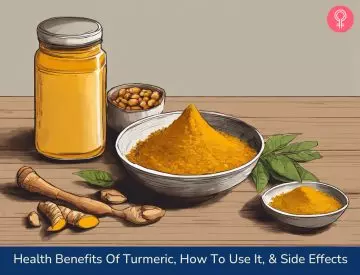
Image: Stable Diffusion/StyleCraze Design Team
Learn the top health benefits of consuming turmeric! Discover how this ancient spice can boost your immunity and improve your overall health. Get health tips and advice on how to incorporate turmeric into your diet in the video below.
Personal Experience: Source
StyleCraze's articles are interwoven with authentic personal narratives that provide depth and resonance to our content. Below are the sources of the personal accounts referenced in this article.
i. What You Need to Know About Turmerichttps://medium.com/@gaybrowne/what-you-need-to-know-about-turmeric-a5f0a259b964
References
Articles on StyleCraze are backed by verified information from peer-reviewed and academic research papers, reputed organizations, research institutions, and medical associations to ensure accuracy and relevance. Read our editorial policy to learn more.
- Prasad, Sahdeo. “Turmeric, the Golden Spice.” Herbal Medicine: Biomolecular and Clinical Aspects. 2nd Edition., U.S. National Library of Medicine, 1 Jan. 1970.
www.ncbi.nlm.nih.gov/books/NBK92752/ - Menon, Venugopal P, and Adluri Ram Sudheer. “Antioxidant and anti-inflammatory properties of curcumin.” Advances in experimental medicine and biologyvol. 595 (2007): 105-25.
https://www.ncbi.nlm.nih.gov/pubmed/17569207 - Barclay, L R et al. “On the antioxidant mechanism of curcumin: classical methods are needed to determine antioxidant mechanism and activity.” Organic lettersvol. 2,18 (2000): 2841-3.
https://www.ncbi.nlm.nih.gov/pubmed/10964379 - Marín, Yarí E et al. “Curcumin downregulates the constitutive activity of NF-kappaB and induces apoptosis in novel mouse melanoma cells.” Melanoma researchvol. 17,5 (2007): 274-83.
https://www.ncbi.nlm.nih.gov/pubmed/17885582 - Nagpal, Monika, and Shaveta Sood. “Role of curcumin in systemic and oral health: An overview.” Journal of natural science, biology, and medicinevol. 4,1 (2013): 3-7.
https://www.ncbi.nlm.nih.gov/pmc/articles/PMC3633300/ - Mishra, Shrikant, and Kalpana Palanivelu. “The effect of curcumin (turmeric) on Alzheimer’s disease: An overview.” Annals of Indian Academy of Neurologyvol. 11,1 (2008): 13-9.
https://www.ncbi.nlm.nih.gov/pmc/articles/PMC2781139/ - Hucklenbroich, Joerg et al. “Aromatic-turmerone induces neural stem cell proliferation in vitro and in vivo.” Stem cell research & therapy vol. 5,4 100. 26 Sep. 2014.
https://www.ncbi.nlm.nih.gov/pmc/articles/PMC4180255/ - Kulkarni, S K, and A Dhir. “An overview of curcumin in neurological disorders.” Indian journal of pharmaceutical sciencesvol. 72,2 (2010): 149-54.
https://www.ncbi.nlm.nih.gov/pmc/articles/PMC2929771/ - “Cardiovascular Diseases.” World Health Organization, World Health Organization.
https://www.who.int/health-topics/cardiovascular-diseases/#tab=tab_1 - Wongcharoen, Wanwarang, and Arintaya Phrommintikul. “The protective role of curcumin in cardiovascular diseases.” International journal of cardiologyvol. 133,2 (2009): 145-51.
https://www.ncbi.nlm.nih.gov/pubmed/19233493 - Yao, Yonggang et al. “Curcumin Exerts its Anti-hypertensive Effect by Down-regulating the AT1 Receptor in Vascular Smooth Muscle Cells.” Scientific reportsvol. 6 25579. 5 May. 2016.
https://www.ncbi.nlm.nih.gov/pmc/articles/PMC4857140/ - Alwi, Idrus et al. “The effect of curcumin on lipid level in patients with acute coronary syndrome.” Acta medica Indonesianavol. 40,4 (2008): 201-10.
https://www.ncbi.nlm.nih.gov/pubmed/19151449 - Unlu, Ahmet et al. “Curcumin (Turmeric) and cancer.” Journal of B.U.ON. : official journal of the Balkan Union of Oncology vol. 21,5 (2016): 1050-1060.
https://www.jbuon.com/archive/21-5-1050.pdf - Liu, Zhijun et al. “Preventive Effect of Curcumin Against Chemotherapy-Induced Side-Effects.” Frontiers in pharmacologyvol. 9 1374. 27 Nov. 2018.
https://www.ncbi.nlm.nih.gov/pmc/articles/PMC6277549/ - Park, Wungki et al. “New perspectives of curcumin in cancer prevention.” Cancer prevention research (Philadelphia, Pa.)vol. 6,5 (2013): 387-400.
https://www.ncbi.nlm.nih.gov/pmc/articles/PMC3693758/ - Ravindran, Jayaraj et al. “Curcumin and cancer cells: how many ways can curry kill tumor cells selectively?.” The AAPS journalvol. 11,3 (2009): 495-510.
https://www.ncbi.nlm.nih.gov/pmc/articles/PMC2758121/ - Zhang, Dong-Wei et al. “Curcumin and diabetes: a systematic review.” Evidence-based complementary and alternative medicine : eCAMvol. 2013 (2013): 636053.
https://www.ncbi.nlm.nih.gov/pmc/articles/PMC3857752/ - Kuhad, Anurag, and Kanwaljit Chopra. “Curcumin attenuates diabetic encephalopathy in rats: behavioral and biochemical evidences.” European journal of pharmacologyvol. 576,1-3 (2007): 34-42.
https://www.ncbi.nlm.nih.gov/pubmed/17822693/ - Zhang, Dong-Wei et al. “Curcumin and diabetes: a systematic review.” Evidence-based complementary and alternative medicine : eCAMvol. 2013 (2013): 636053.
https://www.ncbi.nlm.nih.gov/pmc/articles/PMC3857752/ - Maithili Karpaga Selvi, N et al. “Efficacy of Turmeric as Adjuvant Therapy in Type 2 Diabetic Patients.” Indian journal of clinical biochemistry : IJCBvol. 30,2 (2015): 180-6.
https://www.ncbi.nlm.nih.gov/pmc/articles/PMC4393385/ - Rouse, Michael et al. “Resveratrol and curcumin enhance pancreatic β-cell function by inhibiting phosphodiesterase activity.” The Journal of endocrinology vol. 223,2 (2014): 107-17.
https://www.ncbi.nlm.nih.gov/pmc/articles/PMC4191183/ - Chin, Kok-Yong. “The spice for joint inflammation: anti-inflammatory role of curcumin in treating osteoarthritis.” Drug design, development and therapyvol. 10 3029-3042. 20 Sep. 2016.
https://www.ncbi.nlm.nih.gov/pmc/articles/PMC5036591/ - Daily, James W et al. “Efficacy of Turmeric Extracts and Curcumin for Alleviating the Symptoms of Joint Arthritis: A Systematic Review and Meta-Analysis of Randomized Clinical Trials.” Journal of medicinal foodvol. 19,8 (2016): 717-29.
https://www.ncbi.nlm.nih.gov/pmc/articles/PMC5003001/ - Henrotin, Yves et al. “Curcumin: a new paradigm and therapeutic opportunity for the treatment of osteoarthritis: curcumin for osteoarthritis management.” SpringerPlusvol. 2,1 (2013): 56.
https://www.ncbi.nlm.nih.gov/pmc/articles/PMC3591524/ - Kiyani, Mubin Mustafa et al. “Evaluation of Turmeric Nanoparticles as Anti-Gout Agent: Modernization of a Traditional Drug.” Medicina (Kaunas, Lithuania)vol. 55,1 10. 11 Jan. 2019.
https://www.ncbi.nlm.nih.gov/pmc/articles/PMC6359362/ - Sanmukhani, Jayesh et al. “Efficacy and safety of curcumin in major depressive disorder: a randomized controlled trial.” Phytotherapy research : PTRvol. 28,4 (2014): 579-85.
https://www.ncbi.nlm.nih.gov/pubmed/23832433 - Ng, Qin Xiang et al. “Clinical Use of Curcumin in Depression: A Meta-Analysis.” Journal of the American Medical Directors Associationvol. 18,6 (2017): 503-508.
https://www.ncbi.nlm.nih.gov/pubmed/28236605 - Yu, Jing-Jie et al. “Chronic Supplementation of Curcumin Enhances the Efficacy of Antidepressants in Major Depressive Disorder: A Randomized, Double-Blind, Placebo-Controlled Pilot Study.” Journal of clinical psychopharmacologyvol. 35,4 (2015): 406-10.
https://www.ncbi.nlm.nih.gov/pubmed/26066335 - Sikora, E et al. “The promise of slow down ageing may come from curcumin.” Current pharmaceutical designvol. 16,7 (2010): 884-92.
https://www.ncbi.nlm.nih.gov/pubmed/20388102 - Binic, Ivana et al. “Skin ageing: natural weapons and strategies.” Evidence-based complementary and alternative medicine : eCAMvol. 2013 (2013): 827248.
https://www.ncbi.nlm.nih.gov/pmc/articles/PMC3569896/ - Shehzad, Adeeb et al. “New mechanisms and the anti-inflammatory role of curcumin in obesity and obesity-related metabolic diseases.” European journal of nutritionvol. 50,3 (2011): 151-61.
https://www.ncbi.nlm.nih.gov/pubmed/21442412 - Ejaz, Asma et al. “Curcumin inhibits adipogenesis in 3T3-L1 adipocytes and angiogenesis and obesity in C57/BL mice.” The Journal of nutrition vol. 139,5 (2009): 919-25.
https://pubmed.ncbi.nlm.nih.gov/19297423 - Bradford, Peter G. “Curcumin and obesity.” BioFactors (Oxford, England)vol. 39,1 (2013): 78-87.
https://www.ncbi.nlm.nih.gov/pubmed/23339049 - Teich, Trevor et al. “Curcumin limits weight gain, adipose tissue growth, and glucose intolerance following the cessation of exercise and caloric restriction in rats.” Journal of applied physiology (Bethesda, Md. : 1985)vol. 123,6 (2017): 1625-1634.
https://www.ncbi.nlm.nih.gov/pubmed/28839007 - Yadav, Santosh Kumar et al. “Turmeric (curcumin) remedies gastroprotective action.” Pharmacognosy reviewsvol. 7,13 (2013): 42-6.
https://www.ncbi.nlm.nih.gov/pmc/articles/PMC3731878/ - Patrick, Lyn. “Gastroesophageal reflux disease (GERD): a review of conventional and alternative treatments.” Alternative medicine review : a journal of clinical therapeuticvol. 16,2 (2011): 116-33.
http://archive.foundationalmedicinereview.com/publications/16/2/116.pdf - Baliga, Manjeshwar Shrinath et al. “Curcumin, an active component of turmeric in the prevention and treatment of ulcerative colitis: preclinical and clinical observations.” Food & functionvol. 3,11 (2012): 1109-17.
https://www.ncbi.nlm.nih.gov/pubmed/22833299 - Dulbecco, Pietro, and Vincenzo Savarino. “Therapeutic potential of curcumin in digestive diseases.” World journal of gastroenterologyvol. 19,48 (2013): 9256-70.
https://www.ncbi.nlm.nih.gov/pmc/articles/PMC3882399/ - Hatcher, H et al. “Curcumin: from ancient medicine to current clinical trials.” Cellular and molecular life sciences : CMLSvol. 65,11 (2008): 1631-52.
https://www.ncbi.nlm.nih.gov/pmc/articles/PMC4686230/ - Rahmani, Arshad Husain et al. “Role of Curcumin in Disease Prevention and Treatment.” Advanced biomedical researchvol. 7 38. 28 Feb. 2018.
https://www.ncbi.nlm.nih.gov/pmc/articles/PMC5852989/ - Liu, Liyun et al. “Curcumin ameliorates asthmatic airway inflammation by activating nuclear factor-E2-related factor 2/haem oxygenase (HO)-1 signalling pathway.” Clinical and experimental pharmacology & physiologyvol. 42,5 (2015): 520-9.
https://www.ncbi.nlm.nih.gov/pubmed/25739561 - Kunnumakkara, Ajaikumar B et al. “Curcumin, the golden nutraceutical: multitargeting for multiple chronic diseases.” British journal of pharmacologyvol. 174,11 (2017): 1325-1348.
https://www.ncbi.nlm.nih.gov/pmc/articles/PMC5429333/ - Rivera-Espinoza, Yadira, and Pablo Muriel. “Pharmacological actions of curcumin in liver diseases or damage.” Liver international : official journal of the International Association for the Study of the Livervol. 29,10 (2009): 1457-66.
https://www.ncbi.nlm.nih.gov/pubmed/19811613 - Farzaei, Mohammad Hosein et al. “Curcumin in Liver Diseases: A Systematic Review of the Cellular Mechanisms of Oxidative Stress and Clinical Perspective.” Nutrientsvol. 10,7 855. 1 Jul. 2018.
https://www.ncbi.nlm.nih.gov/pubmed/29966389 - Inzaugarat, María Eugenia et al. “New evidence for the therapeutic potential of curcumin to treat nonalcoholic fatty liver disease in humans.” PloS onevol. 12,3 e0172900. 3 Mar. 2017.
https://www.ncbi.nlm.nih.gov/pmc/articles/PMC5336246/ - Khayat, Samira et al. “Curcumin attenuates severity of premenstrual syndrome symptoms: A randomized, double-blind, placebo-controlled trial.” Complementary therapies in medicinevol. 23,3 (2015): 318-24.
https://www.ncbi.nlm.nih.gov/pubmed/26051565 - Xue, Wen-Yong et al. “Intervention effect and mechanism of curcumin in chronic urinary tract infection in rats.” Asian Pacific journal of tropical medicinevol. 10,6 (2017): 594-598.
https://www.ncbi.nlm.nih.gov/pubmed/28756925 - Ng QX, Soh AYS, Loke W, Venkatanarayanan N, Lim DY, Yeo WS. “A Meta-Analysis of the Clinical Use of Curcumin for Irritable Bowel Syndrome (IBS).” J Clin Med. 2018 Sep 22;7(10):298.
https://pubmed.ncbi.nlm.nih.gov/30248988/ - Bundy R, Walker AF, Middleton RW, Booth J. “Turmeric extract may improve irritable bowel syndrome symptomology in otherwise healthy adults: a pilot study.” J Altern Complement Med. 2004 Dec;10(6):1015-8.
https://pubmed.ncbi.nlm.nih.gov/15673996/ - Vollono, Laura et al. “Potential of Curcumin in Skin Disorders.” Nutrients vol. 11,9 2169. 10 Sep. 2019.
https://www.ncbi.nlm.nih.gov/pmc/articles/PMC6770633/ - Liu, Chi-Hsien, and Hsin-Ying Huang. “In vitro anti-propionibacterium activity by curcumin containing vesicle system.” Chemical & pharmaceutical bulletinvol. 61,4 (2013): 419-25.
https://www.ncbi.nlm.nih.gov/pubmed/23546001 - Vaughn, Alexandra R et al. “Effects of Turmeric (Curcuma longa) on Skin Health: A Systematic Review of the Clinical Evidence.” Phytotherapy research : PTRvol. 30,8 (2016): 1243-64.
https://www.ncbi.nlm.nih.gov/pubmed/27213821 - M. Heng, J. Harker and M. Heng, “Results of Combining Phosphorylase Kinase Inhibition with Removal of Precipitating Factors in Large Cohort of Psoriatic Patients: A Proof of Concept Study,” Journal of Cosmetics, Dermatological Sciences and Applications, Vol. 1 No. 3, 2011, pp. 79-94.
https://www.scirp.org/journal/PaperInformation.aspx?PaperID=7248 - Nardo, Veronica Di et al. “Use of Curcumin in Psoriasis.” Open access Macedonian journal of medical sciencesvol. 6,1 218-220. 21 Jan. 2018.
https://www.ncbi.nlm.nih.gov/pmc/articles/PMC5816303/ - Supplement and Herb Guide for Arthritis Symptoms, Arthritis Foundation.
https://www.arthritis.org/health-wellness/treatment/complementary-therapies/supplements-and-vitamins/supplement-and-herb-guide-for-arthritis-symptoms - Hewlings, Susan J, and Douglas S Kalman. “Curcumin: A Review of Its’ Effects on Human Health.” Foods (Basel, Switzerland)vol. 6,10 92. 22 Oct. 2017.
https://www.ncbi.nlm.nih.gov/pmc/articles/PMC5664031/ - Tang, Minghua et al. “Effect of cinnamon and turmeric on urinary oxalate excretion, plasma lipids, and plasma glucose in healthy subjects.” The American journal of clinical nutritionvol. 87,5 (2008): 1262-7.
https://www.ncbi.nlm.nih.gov/pubmed/18469248 - Smith, Thomas J, and Bimal H Ashar. “Iron Deficiency Anemia Due to High-dose Turmeric.” Cureusvol. 11,1 e3858. 9 Jan. 2019.
https://www.ncbi.nlm.nih.gov/m/pubmed/30899609/ - Kim, Dong-Chan et al. “Anticoagulant activities of curcumin and its derivative.” BMB reports vol. 45,4 (2012): 221-6.
https://pubmed.ncbi.nlm.nih.gov/22531131 - Nebrisi EE. Neuroprotective Activities of Curcumin in Parkinson’s Disease: A Review of the Literature. Int J Mol Sci. 2021
https://www.ncbi.nlm.nih.gov/pmc/articles/PMC8537234/ - Qureshi M et al. “Therapeutic potential of curcumin for multiple sclerosis.” Neurol Sci. 2018.
https://www.ncbi.nlm.nih.gov/pmc/articles/PMC5852989/ - Liu, An-Chang et al. “Curcumin alters the pharmacokinetics of warfarin and clopidogrel in Wistar rats but has no effect on anticoagulation or antiplatelet aggregation.” Planta medica vol. 79,11 (2013): 971-7.
https://pubmed.ncbi.nlm.nih.gov/23807811 - Rahmani, Arshad Husain et al. “Role of Curcumin in Disease Prevention and Treatment.” Advanced biomedical researchvol. 7 38. 28 Feb. 2018.
https://www.ncbi.nlm.nih.gov/pmc/articles/PMC5852989/







